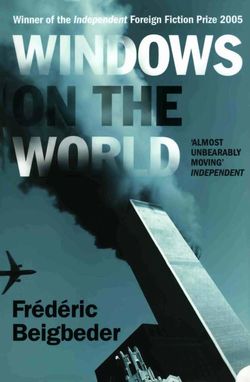Читать книгу Windows on the World - Frédéric Beigbeder - Страница 15
8:38
Оглавление…thereby proving that a cigar can save your life. They should put a new health warning on cigarette packs: “Smoking can cause you to leave buildings before they blow up.”
I would like to be able to change things, to scream at Carthew to get the fuck out of there, fast, GET OUT, TAKE THE KIDS AND MAKE A RUN FOR IT, TELL THE OTHERS, QUICK, GET A FUCKING MOVE ON, THE WHOLE PLACE IS GOING TO BLOW! GET THE FUCK OUT OF THE FUCKING BUILDING!!
Powerlessness, a writer’s vanity. A useless book, like all books. The writer is like the cavalry, always arriving too late. The Maine-Montparnasse tower is wider on the Rue du Départ side: if you wanted to fly a plane into it, you should aim for that side. I’m beginning to fall in love with this building that everyone loathes. I love it at night as much as I loathe it in daylight. Darkness is good for its complexion. In daylight, it is grayish, sad, hulking; only the night makes it brilliant, electric, with the little lights at each corner like a lighthouse in Paris. At night, the tower makes me think of the monolith in 2001: A Space Odyssey: the tall, black rectangular slab which is supposed to symbolize eternity. Last night, I took my fiancee to the nightclub in the basement of the tower. The club used to be call Inferno, but they’ve just renamed it Red Light. There was a twenty-fifth anniversary party for VSD magazine: the place was heaving, queues for the coat check, sponsors, DJs, a couple of VIPs, nothing special. I hugged my darling to me and kissed her at the French equivalent of Ground Zero. I’d quite happily have had her in the restroom, but she refused. “Sorry, tonight my pussy is observing Ramadan!”
I’d like to apologize to the Muslim authorities in advance for the preceding joke. I know perfectly well that it is permitted to eat at night during Ramadan. Be magnanimous. There’s no need for a fatwa: I’m famous enough already. The year 2002 was a pretty complicated one for me. I had a great time and made a complete fool of myself. Let’s not add to that in 2003, if you don’t mind. Apparently, the Tour Montparnasse is in no danger of an attack by Islamic fundamentalists because it houses the French offices of al-Jazeera. I focus on this lightning rod as I dip my toast into my coffee.
The Tour Montparnasse is 656 feet high. To get an idea of the size of the World Trade Center, stack one Tour Montparnasse on top of another and it would still be smaller than the World Trade Center. Every morning, the elevator takes thirty-five seconds to take me to Le Ciel de Paris (fifty-sixth floor); I’ve timed it. In the elevator my feet feel heavy and my ears pop. The rapid elevator creates the same sensation as a plane in an air pocket—without the safety belt. Le Ciel de Paris is all that remains of the Windows on the World: an idea. The preposterous and pretentious idea of a restaurant at the top of a tower which dominates the skyline. Here, the decor is black with a ceiling mimicking a starry sky. There aren’t many people this morning because the weather is miserable. People cancel their reservations when visibility is poor. Le Ciel de Paris is in a sea of fog. You can see nothing but white smoke from the windows. Pressing my nose up against the glass, I can make out the adjoining streets. When I was little, people often told me off for having my head in the clouds; nothing’s changed. The Parker Knoll chairs probably date from the seventies; they’ll be back in fashion soon, the black-and-tan carpet looks like something out of a no-budget indie movie. There is a continual background noise: the air conditioning purrs like a nuclear reactor. I press my face to the glass: a layer of mist shrouds the Rue de Rennes. I’m sitting in a booth padded with brown leather like the ones in the Drugstore Publicis in Saint-Germain (a place which, like Windows on the World, has also disappeared), I’ve ordered freshly squeezed orange juice and some “viennoiseries” (three shriveled mini chocolate croissants), the waitress wears an orange uniform (she’ll come back into fashion too). She brings me the croissants wrapped in a beige napkin. Maybe the al-Qaeda terrorists are simply sick to death of beige, orange uniforms and the businesslike smile of the waitresses.
I feel like shit, sitting here all alone in Le Ciel de Paris at 8:38 AM, a long way above the motorists honking their horns in front of the cinemas in Montparnasse, high above the employees of the Banque National de Paris, 656 feet more stratospheric than ordinary mortals. My life is a disaster, but nobody notices, because I’m too polite—I smile constantly. I smile because I think that if you hide your suffering, it disappears. And it’s true, in a sense: it is invisible, and therefore it does not exist, since we live in a world that worships what is visible, demonstrable, material. My suffering is not material; it is hidden. I am my own revisionist.
